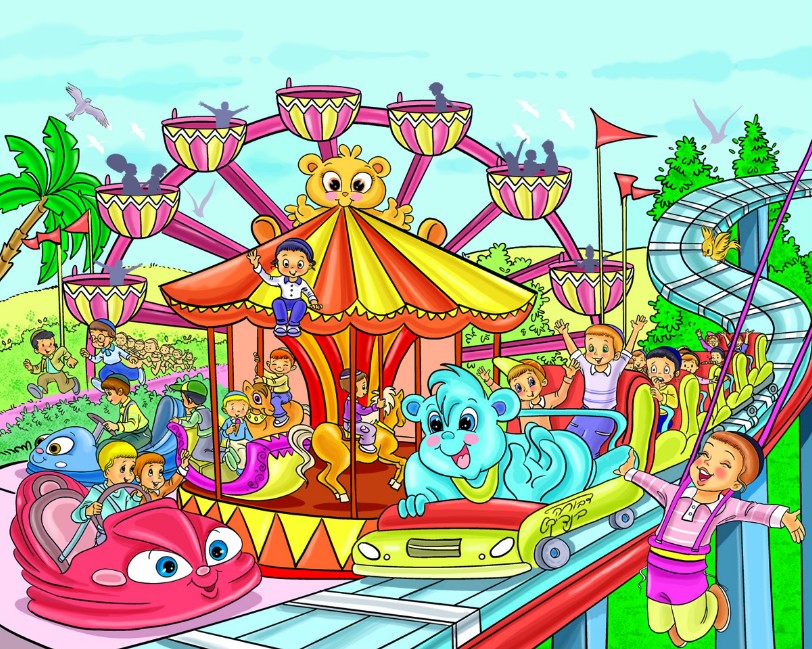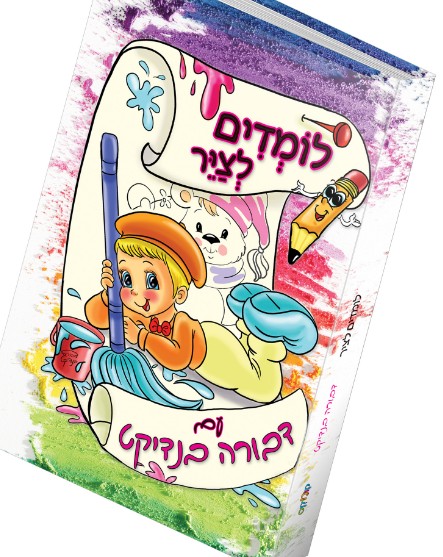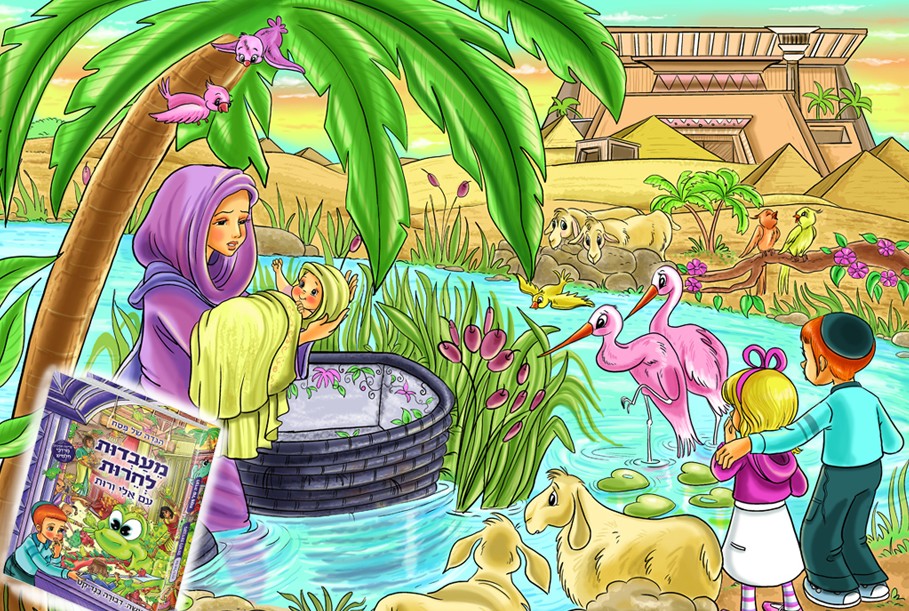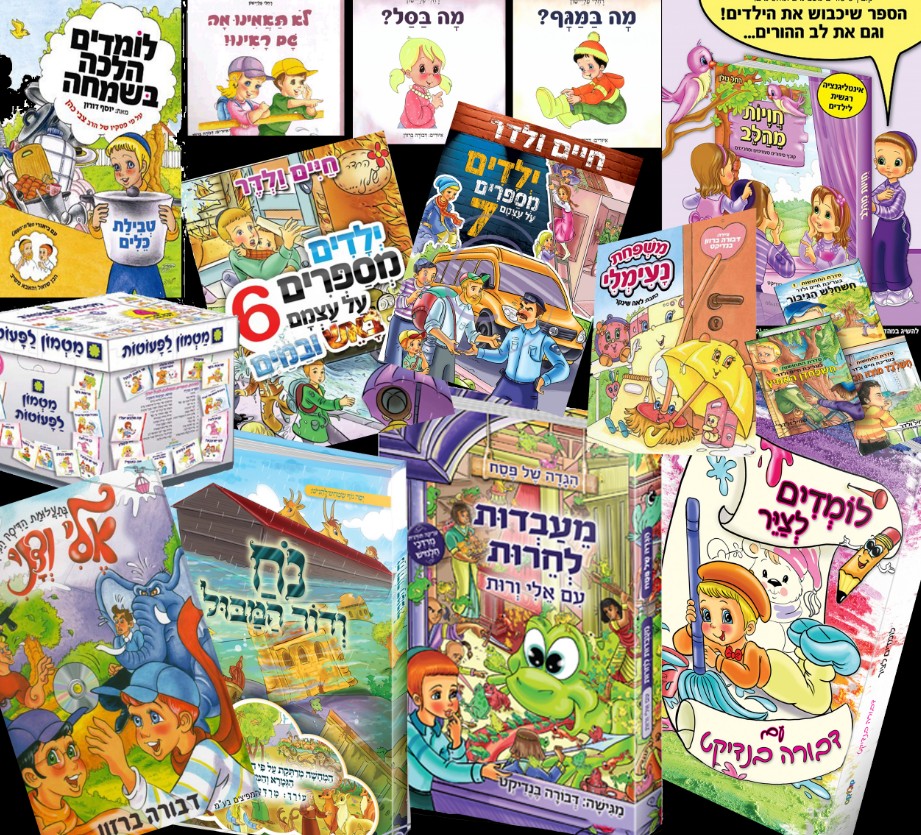The Magic Hands of Illustrator Devorah Berzon-Benedict
Starting her career at 16, Devorah Berzon-Benedict has illustrated over 200 books. Although she never studied the field professionally and intended to pursue medicine, she is now considered a leading illustrator in the Jewish content world. A colorful interview.

 Devorah Berzon-Benedict in action, in front of the computer screen
Devorah Berzon-Benedict in action, in front of the computer screenSometimes it seems that more than Devorah Berzon-Benedict chose this profession, it chose her. Benedict began her career in a completely amateur way, never receiving relevant education in the field, and initially dreamed of studying medicine. Nevertheless, the facts speak for themselves: Benedict is now considered one of the most busy and sought-after illustrators in the country, with truly golden hands, if you will.
Benedict, 27, from Bnei Brak, began drawing at 16 when she illustrated her first books, which were a series of books for toddlers in a secular publishing house. But even before that, around grades 5-6, she developed a reputation as a painter among her peers by drawing pictures for her classmates from family photos they brought in exchange for the equivalent of 'Bazooka gum', as she puts it. 'I never thought I would end up focusing on this,' she says, 'and over time, I received more job offers until it became part of me. As a kid, I made a lot of pocket money from it which really helped me.'
As she grew up, she studied at a seminar in Petach Tikva, when she actually dreamed of studying medicine. 'I was very drawn to the aspect of helping people in distress, and since my seminar offered nothing related, I studied special education. Alongside my studies, I worked on various books at publishing houses. It developed so much that more and more publishing houses approached me through word of mouth. It started mainly from books seen on the shelf and then turned into a broad client circle. I found myself getting sucked in completely. After finishing the seminar, I told myself: "Okay, I'll keep working, and when it calms down a bit - I'll leave everything and go study medicine."
'Since then it continued, and suddenly I derived so much enjoyment from it that I decided not to stop. So I just decided to continue from there. In the meantime, I got married, had children, so you don't have much time to think about such things. I'm satisfied with where I am today.'
 The most colorful amusement park around. Another vibrant creation by Berzon-Benedict
The most colorful amusement park around. Another vibrant creation by Berzon-Benedict'Come back in twenty years'
However, despite her great talent – it turns out that success did not come to her so quickly, at least not concerning her breakthrough in the Haredi world. 'It wasn't easy for me to enter the field at first,' she describes, 'I called publishing houses and as soon as they heard a girl's voice they said: "Come back to us in 20 years." My beginning was actually in the secular community, which was easier to enter. From there, I got into the Haredi community.'
Later, Benedict illustrated Chaim Walder's 'Feelings series', such as 'Scared', 'Weak', and 'Alone in the House', as well as the 'Children Tell About Themselves' series, encyclopedias for toddlers, and more. Simultaneously, at only 18, she began working as a drawing teacher for boys and girls of elementary school age, in Haredi schools.
 Cover of the book 'Learning to Draw'
Cover of the book 'Learning to Draw'Was it always a talent you had? Did you think you’d become an illustrator?
'Many ask me where I learned. The truth is I didn't study anywhere. When I was younger, there wasn't yet a professional Haredi place to study. There were some amateurish classes in homes. They would place a vase in the middle of the table and you'd have to copy it. That was about how it looked. So besides a few such classes, I didn't study anywhere. It was all self-training and willpower. I knew I had the talent because from zero age I constantly drew, at any free moment I had, and at some point, I told myself: "Let’s make money from this." I practiced a lot, looked at various works of famous illustrators abroad, and learned from it. A lot of practice.'
There were years I thought of leaving the profession
Besides a successful career as an illustrator, Benedict maintains another career, no less important than the former: the career of motherhood. Benedict is a mother to two toddlers, whom she tries to raise with dedication amid the laundry–dishes–work demands she can’t compromise on.
'There were years I thought of leaving the profession just because it interfered with working from home, and it was disorganized for me. But each time I came back to it. When I see what's happening around me today, and how tiring and exhausting it is to get up for a job that doesn’t speak to you and doesn’t interest you, with one big 'ugh' - then I don’t want to switch jobs. I thank Hashem that I wake up every morning, enjoy going to the workroom, and sit at the computer.'
'However, of course, there are also disadvantages. Sometimes it’s working at ungodly hours, it’s disorganized, I work at night, in the morning, noon, and in between, and it often comes at the expense of the children. It’s also working with a "robot", I don’t have colleagues as part of the work, so it’s working on it at other times of the day, so you have a social life, then along the way, since you’re at home, you have to pause for laundry, prepare lunch, and then return to the computer. In an organized office job, on the other hand, you’re not at home, you don’t go to do laundry and prepare lunch, and that’s the advantage, but on the other hand, in the big vacation, I take my computer and can work at any hours I want.'
How long does it take to make each drawing ordered from you? It seems like an ant's work.
'Depends. Sometimes it’s really ant’s work. There, for instance, is a book I released for Passover, which is actually a Haggadah, which took me a year to illustrate, along with other side projects. This Haggadah, for example, was a bunch of millions of small details and was quite a piece of work. It’s something that requires tremendous patience because anyone who doesn’t have patience - it’s very discouraging. The feedback is received only at the end, and until reaching this stage, you go through a lot, work terribly hard, and need a lot of self-discipline.'
 A charming illustration, from the book 'From Slavery to Freedom with Eli and Ruth'
A charming illustration, from the book 'From Slavery to Freedom with Eli and Ruth'When children read the books I illustrated – it’s worth everything
Today, Benedict works with successful publishers in the USA and France, and with three regular newspapers: "HaModia", "B’Kehila", and "Comics". Besides that, she has already illustrated more than 200 books at least, including entire encyclopedias. 'Today I no longer count how many books I illustrate, at one time I did, but now I've stopped.'
Additionally, Benedict has managed to release four of her own books: "Learning to Draw with Devorah Benedict" - a light and enjoyable book teaching the basics of drawing, built in stages and at different levels suitable for all ages, including tips on using types of colors, how to hold a pencil, how to color using different kinds of paints, and more. She later released "From Slavery to Freedom with Eli and Ruth" - a Passover Haggadah she released together with author Mordechai Halamish, and "The Comic Adventures of Eli and Dani and the Mystery of the Mysterious Disc". Right after the holidays, she’s expected to release "Learning to Draw 2", the second in the series.
With what do you draw?
'I work on a computer with a touch screen and an electronic pen. It looks like drawing on paper, but it’s of course much more sophisticated. I simply draw as usual, and I don’t use a mouse and keyboard.'
 A collection from the books illustrated by Devorah Berzon-Benedict
A collection from the books illustrated by Devorah Berzon-BenedictWho is your inspiration?
'The artist Yoni Gerstein. I know him personally, and have consulted with him in the past, and he encouraged me to continue, even though he didn’t spare me from criticism. Since I love criticism so much, it encouraged me to prove to myself that I can rise above his criticism and improve because of it. He is definitely the role model.'
Sometimes when a hobby becomes a profession, it turns into something you hate. Does it ever happen to you?
'The greatest satisfaction for me is working on a book and seeing it in a store. There are periods when after I print a book I worked on day and night, I experience an energy drop for a week or two. In such cases, I need to relax and not work. After relaxation, I return to it. It is very satisfying to see children looking in the books I illustrated. It’s worth everything. You know you’re contributing, you have a demanding job, you’re creating for thousands of people.'
What do you think of the whole comic scene, which has been heavily developing in recent years?
'I think there are two sides to the coin here. On the one hand, it’s a less positive thing because children read less, but rather look more at pictures, and then their imagination develops less. On the other hand, we must remember the main reason it developed in the Haredi sector - because in the Haredi public there are no films and series, and it’s a kind of substitute for movies. It’s easy to see how similar it is - box by box like a moving picture, and if children enjoy it - why not. But when it becomes the only literature - it’s not a positive thing and does not develop or enrich the imagination. In general, when it’s not just comics - I’m for them enjoying.'
Do you think you’ll make movies someday? Were you offered?
'It’s very possible. It’s a field that interests me greatly, and it might be that in the future I will do it, even if it doesn’t bring me profit, but only satisfaction because that would essentially be my only consideration whether to get into it. The problem is, there’s so much burning and copying - then I won’t have profit, only satisfaction, so I’m still weighing it, but who knows.'
You’ve already conquered such high peaks. What do you wish for yourself moving forward?
'Basically, it seems to me that I can say I have achieved all my goals, but I’m always hungry for more, even when I get insane amounts of work, and I’m overwhelmed to the point of absurdity. It’s hard for me to refuse, my 'appetite' never ends. But I don’t know how to say where, I have no idea.
'I only know I keep getting feedback from "my clients." Many children call me and ask if I am the artist, or many little kids call and say "Thank you, we enjoyed the book so much, when are you releasing another one." It’s very touching and joyful, and it gives a lot of strength to go on. So, as long as there are such sweet feedback – there will surely be energy for me to continue, with Hashem’s help.'
Would you also like to thank Devorah for the special books? For inquiries on this topic, or any subject, you can write to Devorah Berzon-Benedict, at devorab10@gmail.com

